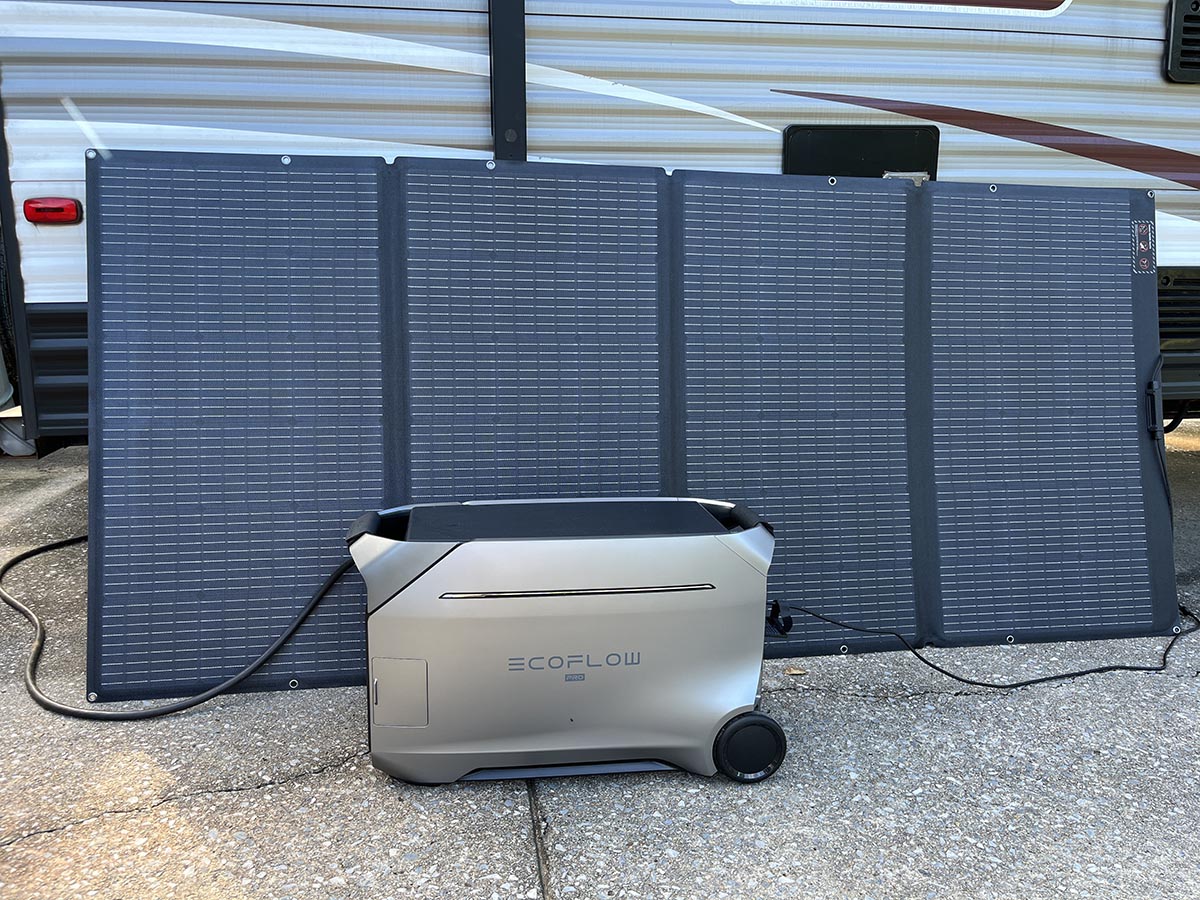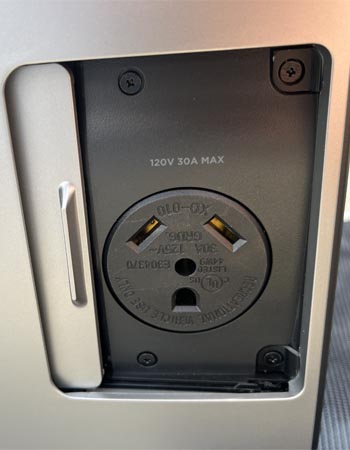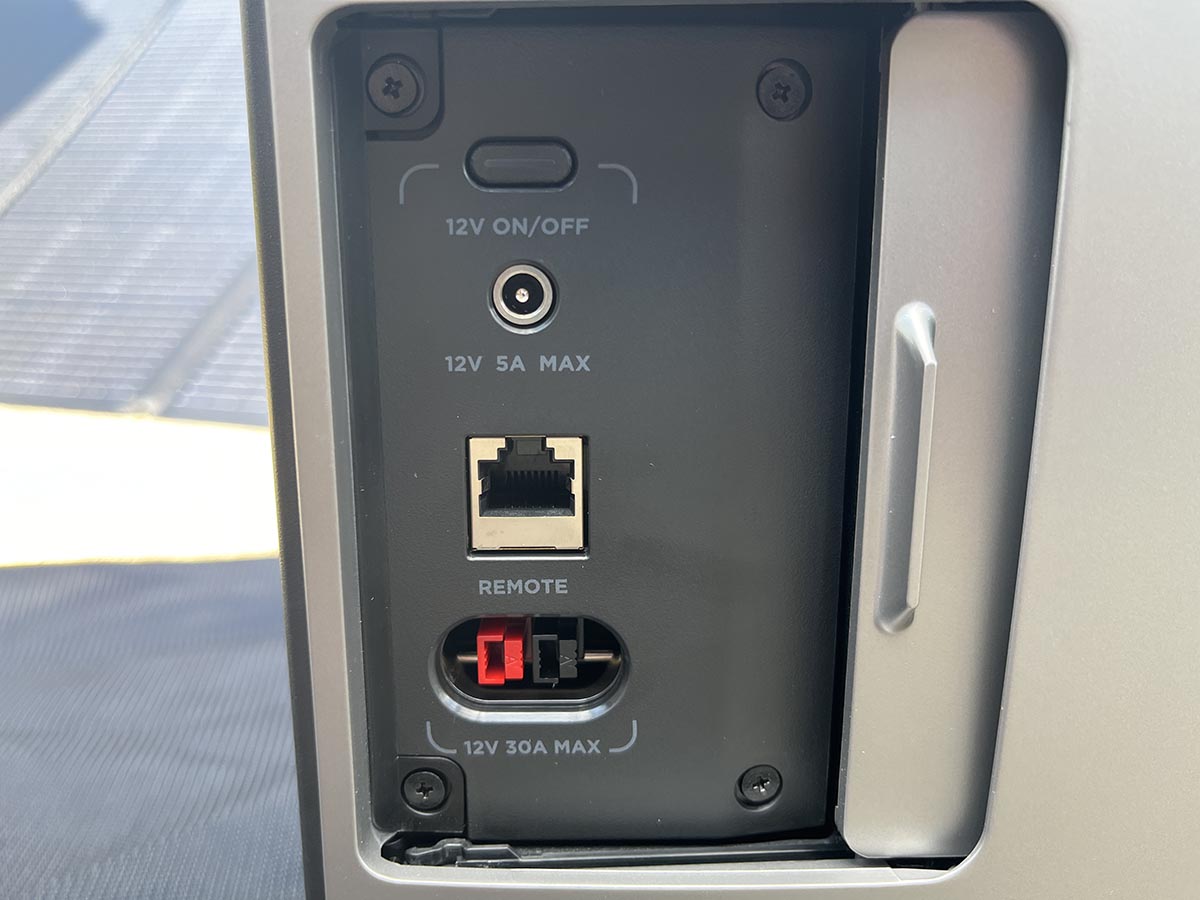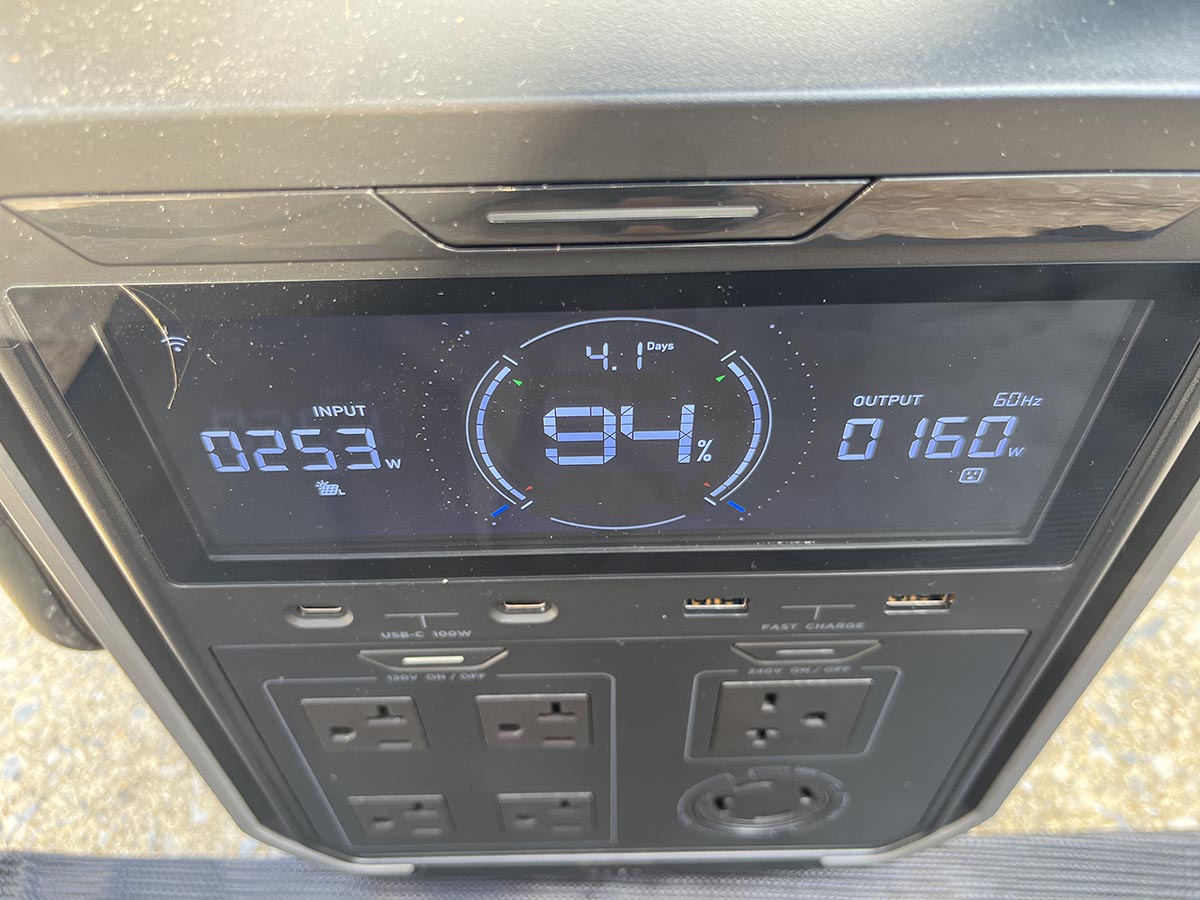
We may earn revenue from the products available on this page and participate in affiliate programs. Learn More ›
When a storm pops up and the electricity grid goes down, the EcoFlow Delta Pro 3 portable power station might be the best backup plan—short of installing a standby generator. Essentially a battery in a box with an inverter and outlets to supply corded devices, a portable power station fulfills the role of a generator without noise or exhaust fumes.
This model features a massive battery bank and an advanced power management system to power a home’s critical power needs during an outage. It is easy to use and has an incredibly flexible charging system. I tested the EcoFlow Delta Pro 3 for 2 months and can highly recommend it. Keep reading to discover why.
EcoFlow Delta Pro 3 Portable Power Station: At a Glance
Our rating: 4.8/5
| EcoFlow Delta Pro 3 Specs | |
| Capacity | 4,096 watt-hours (Wh) |
| Output | 4,000 running watts; 8,000 surge watts |
| Outlets | AC 120 volt, USB-A, USB-C, 120/240, high voltage, 30-amp RV, DC 12 volt |
| Charging options | Wall/gas generator outlet, auto outlet, solar, EV station, RV/van alternator, EcoFlow Smart Home Panel, combination |
| Expandable capacity | Up to 2 EcoFlow Smart Extra Batteries (3,600 watt-hours each) |
| Dimensions | 27.28 inches long by 13.43 inches wide by 16.14 inches high |
| Weight | 113.54 pounds |
Testing the EcoFlow Delta Pro 3 Portable Power Station
For 2 months in the late summer, I had the opportunity to test the EcoFlow Delta Pro 3 portable power station during a short storm-related power outage at my house, on a sunny weekend camping trip with my small travel trailer, and for a few additional controlled tests. Since the kit I tested came with a 400-watt solar panel, I was able to try several charging combinations and find out what happens during simultaneous solar charging while powering my camper. Testing this product gave me a lot to consider, on its own and compared to other portable power stations and inverter generators that I’ve tested. Read on to learn more.
| What We Like | What We Don’t Like |
| Plug-and-play model | Heavy; requires team lifting for safety |
| Monitor and manage with the EcoFlow app | May be too bulky for car camping |
| Easy to add more battery storage | |
| Numerous charging options | |
| Transport wheels and telescoping handle |
Jam-Packed With Premium Features

The EcoFlow Delta Pro 3 was designed to power essential home appliances through a power outage or to conveniently deliver electricity on the go. A 4,000-kilowatt-hour lithium iron (Li-Fe) battery bank is at the core of the power station. The sealed battery bank is IP65-rated dustproof and waterproof, supporting indoor and sheltered outdoor operation. It offers years of dependable service, with a working lifespan of 4,000 charge cycles.
Charging options are plentiful. The EcoFlow Delta Pro 3 offers seven unique and 18 combination charging methods. It supports 120-volt and 240-volt AC charging, high- and low-voltage solar charging, car charging, and combination charging through AC and solar ports at the same time. Charging times vary: 50 minutes to 80 percent and 2 hours to full charge using an AC wall outlet; 12 to 24 hours using a single 400-watt solar panel (the unit supports up to three solar panels for charging in as little as 4 to 8 hours); or about a day and a half through the car charging port. It also allows for solar charging while outputting power.
Power output is where this unit truly shines. It is capable of running multiple devices at the same time, including high-power-draw household appliances, with up to 4,000 running watts and 8,000 surge watts. This is one of the few portable power stations to include three high-output outlets: a 30-amp RV (TT30R) outlet, a 120/240-volt transfer switch (NEMA L30-14R) outlet, and a 240-volt appliance (NEMA 5-20R) outlet. The unit also boasts four 120-volt AC outlets, four USB ports, and a 12-volt DC port.
As you might expect from a top-of-the-line power station, the EcoFlow Delta Pro 3 offers outstanding monitoring and control options. It features independent onboard controls to activate the 120-volt, 240-volt, and DC outlet clusters. The digital display shows the input wattage, output wattage, charge status, and remaining runtime based on current usage. It is also Bluetooth and Wi-Fi enabled for remote monitoring and control through the EcoFlow mobile app.
As a whole-home backup system, EcoFlow Delta Pro 3 is expandable to 48 kWh if you max out on battery add-ons and parallel connections. It also integrates with the much broader EcoFlow ecosystem. In this configuration, it can remain plugged in without the risk of overcharging or premature battery failure, thanks to a smart charge management system. When backing up sensitive electronics, the 10-millisecond Uninterruptible Power Supply (UPS) ensures that nothing suffers from an electrical disruption.

Built to Transport, but Loading Can Be a Challenge
As a portable power station, the EcoFlow Delta Pro 3 is larger, heavier, and provides much more power than most of its competitors. I liked that it was readily equipped to power my RV without an adapter, so I gave it a try as soon as possible. The telescoping handle and 4-inch wheels make it fairly easy to move across hard floors and pavement, but I used a cart for any extensive movement over grass, gravel, or other uneven ground.
With the power station being about the same size as a large cooler, I had to plan the packing arrangement as I prepared for my camping trip. If I were car camping in a tent, this unit might be excessively large, but it was just right for my travel trailer. For comparison, I normally use a 4,500-watt inverter generator to run the camper, and this power station was similar in size and weight.
Loading it into the truck took some effort, even for two people, but the molded handles on either end prevented some hand and back strain. Instead of a rubberized overmold or other built-in padding system, this model has textured grip protector strips to wrap the handles. The fit is snug to resist slipping and gives the handles just enough padding.
Starting with the fully charged power station, I estimated that I could power the camper from Friday night through Sunday morning, but I also wanted to experiment with the solar panel. It needed additional space—the dimensions are 42 inches long by 26 inches wide by 2.5 inches tall in the storage bag—so I secured it inside the camper. If I were boondocking for a week, I would want to have two additional solar panels to hedge against less-than-ideal sunshine.

Lots of Power for a Little While…or a Little Power for a Long Time
The manufacturer’s website claims that the EcoFlow Delta Pro 3 can run a home refrigerator for 3 days. I tested it in camp on a warm, clear day with temperatures in the upper 80 degrees Fahrenheit. I plugged the camper into the power station and turned on the air conditioner and refrigerator (which was still warm inside because I did not precool it with grid power at home).
I noted the power draw of the fridge (170 to 180 watts), air conditioner (755 to 780 watts), and both combined (890 and 910 watts). After the first hour of both appliances running (in active cooling mode essentially the whole time), the power station charge was depleted by 5 percent. When I added the solar panel (facing south, angled about 45 degrees), the solar input reading ranged between 320 and 335 watts. After a second hour of running both appliances—while solar charging at the same time—the charge only depleted an additional 2 percent.
After I took those test readings, I put away the solar panel and turned off the air conditioner until later that night when I needed it. With my normal camping usage patterns from Friday night through Sunday morning, which included keeping the fridge plugged in, running the air conditioner only while I slept, and occasionally using the microwave for a minute or so at a time, the EcoFlow Delta Pro 3 still had an 18 percent charge when I went home.
At home, I recharged the power station and set it up as a charging base for my family’s four laptop computers, four phones, and three tablets. I was surprised to see how slowly the charge depleted. After 2 weeks, I ended the experiment, and the power station still had a 51 percent charge.

A Premium Power Station at a Premium Price
With its huge battery bank, high output capability, expandability, and advanced connectivity features, the EcoFlow Delta Pro 3 is arguably the most versatile power station on the market. In its base configuration, it can keep your home operational when the power goes out or power up all of your gadgets while traveling. This level of robust functionality doesn’t come cheap, but the base price of $3,699 is not outrageous. It is currently listed on sale for $3,399 on the EcoFlow website. It is also available for purchase bundled with a 400-watt solar panel for a regular price of $4,898, or $3,699 on sale.
Buy the EcoFlow Delta Pro 3 at:

Product Comparisons
| EcoFlow Delta Pro 3 | EcoFlow Delta 2 Max See our review. | Anker Solix F3800See our review. | Jackery 3000 ProSee our review. | Bluetti AC500+B300S | |
| Capacity | 4,096 Wh | 2,048 Wh | 3,840 Wh | 3,024 Wh | 3,072 Wh |
| Battery Chemistry | LFP | LFP | LFP | Li-ion | LFP |
| Output/Surge | 4,000 watts | 2,400 watts | 6,000 watts | 3,000 watts | 5,000 watts |
| Surge | 8,000 watts | 4,800 watts | 9,000 watts | 6,000 watts | 10,000 watts |
| Outlets | AC 120 volt, USB-A, USB-C, 120/240, high voltage, 30-amp, DC 12 volt | AC 120 volt, USB-A, USB-C, Car, DC 12 volt | AC 120 volt, USB-A, USB-C,Car,120/240, 30 amp | AC 120 volt, USB-A, USB-C, Car, 25 amp | AC 120 volt, USB-A, USB-C, Wireless charging pad, Car, NEMA14-50, L14-30, TT-30, DC 12 volt, 24 volt |
| Charging Options | Wall outlet/gas generator, car, solar, EV station, RV/van alternator, EcoFlow Smart Home Panel, combination | Wall outlet/gas generator, car, solar | Wall outlet/gas generator, solar | Wall outlet/gas generator, car, solar | Wall outlet/gas generator, car, solar |
| Dimensions | 27.28 inches long by 13.43 inches wide by 16.14 inches high | 19.6 inches long by 9.5 inches wide by 12 inches high | 15.1 inches long by 14.6 inches wide by 27.6 inches high | 18.6 inches long by 14.1 inches wide by 14.7 inches high | 20.5 inches long by 12.8 inches wide by 24.6 inches high |
| Weight | 113.54 pounds | 50 pounds | 132.3 pounds | 63.93 pounds | 149.5 pounds |
| Wheels | Yes | No | Yes | Yes | No |
| Price | $3,699 | $1,699 | $2,999 | $2,499 | $2,499 |
Is the EcoFlow Delta Pro 3 Portable Power Station Right for You?
Portable power stations have grown increasingly powerful and capable, but the added functionality comes with increased size and weight. While the 4,000-watt-hour EcoFlow Delta Pro 3 is an incredibly capable device, it is probably approaching the practicality threshold for some portable applications. Padded handles, a telescoping handle, and transport wheels make this model easier to reposition, but loading and moving it is physically demanding. That being said, it takes about as much effort to set up this power station as a midsize portable gas generator. Depending on usage, it could be an excellent complement to or a replacement for an inverter generator.
As a power backup device, the EcoFlow Delta Pro 3 offers numerous advantages. It packs enough wattage to run multiple high-draw appliances simultaneously for several hours. It also includes a transfer switch outlet that can keep multiple home circuits up and running. In addition to its powerful stand-alone capabilities, this portable power station is expandable and parallel capable—build it out to provide up to 48 kWh of capacity. It is also compatible with an array of whole-home backup and off-grid power solutions. If your main concern is keeping the lights on or maintaining uninterrupted power to critical devices, the EcoFlow Delta Pro 3 portable power station could be your best option.
Meet the Tester
Mark Wolfe is a writer and product tester with a background in the green industry. He’s also an avid DIYer living in an older home. When he isn’t writing, he spends his time upgrading, repairing, and replacing anything and everything in his home, yard, and garden. He tests and writes reviews about hand tools, lawn care and home repair products, and outdoor living goods.
